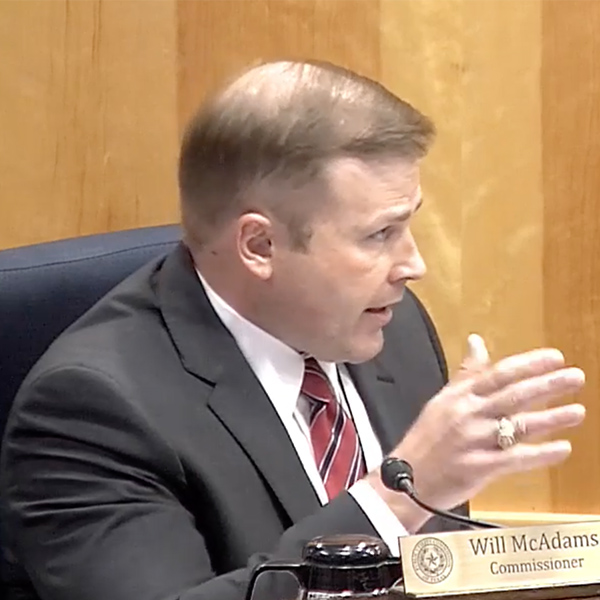Texas regulators on Thursday rejected Southwestern Electric Power Co.’s (SWEPCO) application to build renewable generation resources at the site of a coal plant that ceased operations in March.
The Public Utility Commission rejected an administrative law judge’s proposed decision and denied SWEPCO’s application for a certificate of convenience and necessity to construct 237 MW of accredited renewable capacity where the coal-fired Pirkey Plant has stood for 37 years (53625).
SWEPCO’s parent company, American Electric Power (NASDAQ:AEP), announced in 2020 it would retire the 580-MW plant to comply with environmental regulations. Opponents of the closure said the plant should operate for another 22 years. (See Texas Lawmakers Push to Save Retiring Coal Plant.)
The utility issued requests for proposals for three options: wind, solar and short-term capacity purchases. It told the PUC the facilities would have a nameplate rating of 1,000 MW, translating to 237 MW of accredited capacity.
 PUC’s Will McAdams lays out his case against SWEPCO’s proposed renewable facility. | AdminMonitor
PUC’s Will McAdams lays out his case against SWEPCO’s proposed renewable facility. | AdminMonitorCommissioner Will McAdams criticized SWEPCO’s argument in a memo filed before the open meeting, saying the facilities’ accreditation would likely be less than 237 MW. He said the utility failed to “properly account” for the change in accreditation methodology underway at SPP, which is re-evaluating its policy on intermittent resources’ capacity contribution at peak. McAdams chairs the SPP stakeholder group re-evaluating that policy.
“This decision to limit the RFPs to these three options was based on flawed assumptions and led to inadequate consideration of alternative generation options,” McAdams wrote. SWEPCO’s “analysis also failed to consider the approximately $200 million that SWEPCO will try to recover from ratepayers in unrecovered costs, and the intervening cost of capacity purchases that would be necessary while waiting for these proposed facilities to be built.”
He said SWEPCO failed to adequately evaluate available alternatives, including power purchase agreements and converting Pirkey to natural gas. “I am keenly aware of the pressing need for dispatchable generation in” SPP, he said.
McAdams also noted the Louisiana Public Service Commission’s April rejection of a proposed settlement with SWEPCO. The PSC denied the agreement because it said the utility failed to adequately consider PPAs as an alternative to the proposed facilities (U-36385).
AEP has made no bones in recent years about increasing its renewable energy output and shutting down its less efficient coal plants.
“One closing thought for SWEPCO’s benefit and, frankly, all of our non-ERCOT utilities,” McAdams told SWEPCO representatives: “I think what Texas needs, and what you could be invaluable in helping us with, is a message to [AEP headquarters in] Columbus [Ohio] … that the environment you’re operating in is changing; the ability for you to meet the core responsibility of that regulated utility — which is the reliability of your system — is being affected.
“The reserve margin in SPP is declining in terms of an accredited value being provided. In a system like that, the whole construct of not just capacity [and] resource adequacy but overall reliability is being pressured,” he added. “We understand the need to diversify your portfolio, but we need it to be done in a balanced, methodical way in the very near future, because it’s the near future that we are very concerned about.”
The order led Guggenheim Securities analyst Shar Pourreza to say AEP needs to “reassess” its regulatory affairs leadership following the latest in “repeated missteps,” according to Seeking Alpha.
“While fundamentals are a question mark, the real facet of this AEP story is more centered on regulatory strategy and execution,” Pourreza wrote. He said AEP CEO Julie Sloat may need to “reassess the company’s regulatory affairs leadership and approach given the optics of repeated missteps where unabashed confidence continues to be followed by denials and disappointing outcomes.”
AEP’s share price closed at $82.25 on Friday, down $2.08 (2.47%) from its $84.33 open the morning of the PUC’s open meeting.
Scott Blake, AEP’s director of media relations and policy communications, declined to respond to Pourreza’s comments but said the company is focused on a settlement in Arkansas and “following through” on the process in Louisiana.
“We will be reviewing the details of the PUCT’s order to understand the full scope of the commission’s decision and determine our next steps in Texas,” he said in an email to RTO Insider.
Senate Confirms Jackson
The Texas Senate on Friday unanimously confirmed Kathleen Jackson’s appointment to the PUC.
Gov. Greg Abbott nominated Jackson to the commission in August, when the legislature was not in session.
“I am grateful to Gov. Abbott and the Texas Senate for trusting me with this responsibility,” Jackson said in a statement. “As our state continues to experience incredible growth, the Public Utility Commission of Texas’ mission to ensure reliable and affordable power has never been more important.”
Jackson has been tasked with leading the PUC’s efforts to improve the grid’s energy efficiency.



